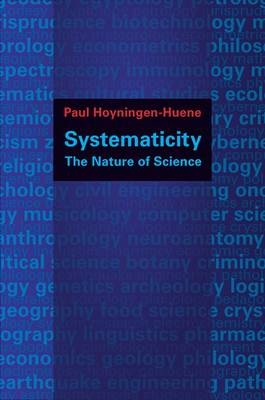
Systematicity
Oxford University Press Inc (Verlag)
978-0-19-998505-0 (ISBN)
In Systematicity, Paul Hoyningen-Huene answers the question "What is science?" by proposing that scientific knowledge is primarily distinguished from other forms of knowledge, especially everyday knowledge, by being more systematic. "Science" is here understood in the broadest possible sense, encompassing not only the natural sciences but also mathematics, the social sciences, and the humanities. The author develops his thesis in nine dimensions in which it is claimed that science is more systematic than other forms of knowledge: regarding descriptions, explanations, predictions, the defense of knowledge claims, critical discourse, epistemic connectedness, an ideal of completeness, knowledge generation, and the representation of knowledge. He compares his view with positions on the question held by philosophers from Aristotle to Nicholas Rescher. The book concludes with an exploration of some consequences of Hoyningen-Huene's view concerning the genesis and dynamics of science, the relationship of science and common sense, normative implications of the thesis, and the demarcation criterion between science and pseudo-science.
Paul Hoyningen-Huene is a philosopher of science with a PhD in theoretical physics teaching at the Institute of Philosophy at the Leibniz University of Hannover, Germany. He is best known for his book Reconstructing Scientific Revolutions: Thomas S. Kuhn's Philosophy of Science (1993).
Preface ; 1 Introduction ; 1.1 Historical Remarks ; 1.2 The Question "What Is Science?" in Focus ; 2 The Main Thesis ; 2.1 Science and Systematicity ; A) A Little History ; B) Preliminary Remarks ; 2.2 The Concept of Systematicity ; 2.3 The Structure of the Argument ; 3 The Systematicity of Science Unfolded ; 3.1 Descriptions ; A) Some Preliminaries ; B) Axiomatization ; C) Classification, Taxonomy, and Nomenclature ; D) Periodization ; E) Quantification ; F) Empirical Generalizations ; G) Historical Descriptions ; 3.2 Explanations ; A) Some Preliminaries ; B) Explanations Using Empirical Generalizations ; C) Explanations Using Theories ; D) Explanations of Human Actions ; E) Reductive Explanations ; F) Historical Explanations ; G) Explanation and Understanding in the Humanities in General ; H) Explanations in the Study of Literature ; 3.3 Predictions ; A) Some Preliminaries ; B) Predictions Based on Empirical Regularities of the Data in Question ; C) Predictions Based on Correlations with Other Data Sets ; D) Predictions Based on (Fundamental) Theories or Laws ; E) Predictions Based on Models ; F) Predictions Based on Delphi Methods ; 3.4 The Defense of Knowledge Claims ; A) Some Preliminaries ; B) Non-Evidential Considerations ; C) Empirical Generalizations, Models, and Theories ; D) Causal Influence ; E) The Verum Factum Principle ; F) The Role of Mathematics in the Sciences ; G) Historical Sciences ; 3.5 Critical Discourse ; A) Some Preliminaries ; B) Norms and Institutions ; C) Practices in Science Fostering Critical Discourse ; 3.6. Epistemic Connectedness ; A) Preliminaries: The Problem ; B) Failing Answers ; C) The Concept of Epistemic Connectedness ; D) Revisiting the Examples ; 3.7 The Ideal of Completeness ; A) Some Preliminaries ; B) Examples ; 3.8 The Generation of New Knowledge ; A) Some Preliminaries ; B) Data Collection ; C) The Exploitation of Knowledge from Other Domains ; D) The Generation of New Knowledge as an Autocatalytic Process ; 3.9 The Representation of Knowledge ; A) Some Preliminaries ; B) Examples ; 4 Comparison with Other Positions ; 4.1 Aristotle ; A) The Position ; B) Comparison with Systematicity Theory ; 4.2 Rene Descartes ; A) The Position ; B) Comparison with Systematicity Theory ; 4.3 Immanuel Kant ; A) The Position ; B) Comparison with Systematicity Theory ; 4.4 Logical Empiricism ; A) The Position ; B) Comparison with Systematicity Theory ; 4.5 Karl R. Popper ; A) The Position ; B) Comparison with Systematicity Theory ; 4.6 Thomas S. Kuhn ; A) The Position ; B) Comparison with Systematicity Theory ; 4.7 Paul K. Feyerabend ; A) The Position ; B) Comparison with Systematicity Theory ; 4.8 Nicholas Rescher ; A) The Position ; B) Comparison with Systematicity Theory ; 5 Consequences for Scientific Knowledge ; 5.1 The Genesis and Dynamics of Science ; A) Conceptual Clarifications ; B) The Genesis of a Science ; C) The Dynamics of Science ; 5.2 Science and Common Sense ; A) The Preservation of Common Sense ; B) The Deviations from Common Sense ; C) Additional Remarks ; 5.3 Normative Consequences ; 5.4 Demarcation from Pseudo-Science ; A) A Little History ; B) Systematicity Theory's Demarcation Criterion ; 6 Conclusion ; Notes ; Literature ; Literature
| Reihe/Serie | Oxford Studies in Philosophy of Science |
|---|---|
| Verlagsort | New York |
| Sprache | englisch |
| Maße | 236 x 165 mm |
| Gewicht | 530 g |
| Themenwelt | Geisteswissenschaften ► Philosophie ► Metaphysik / Ontologie |
| Naturwissenschaften | |
| ISBN-10 | 0-19-998505-7 / 0199985057 |
| ISBN-13 | 978-0-19-998505-0 / 9780199985050 |
| Zustand | Neuware |
| Haben Sie eine Frage zum Produkt? |
aus dem Bereich


